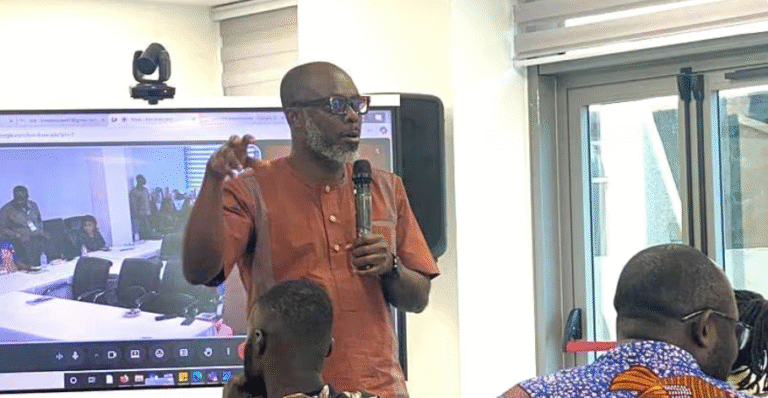Dr Stephen Yamoah
The Executive Director of Nuclear Power Ghana, Dr. Stephen Yamoah, has emphasized that Ghana’s nuclear power programme is not solely about producing electricity, but about ensuring the country fully benefits from every aspect of the initiative.
He said this during a media workshop on October 2, aimed at educating journalists about the broader goals of Ghana’s nuclear power agenda.
“Right from the onset, this programme had an objective, a goal, and a value. It’s not just about adding electrons to the grid or increasing megawatts,” Dr. Yamoah stated. “It is a bigger goal, a bigger agenda. Nuclear is supposed to be a catalyst—a springboard for industrial growth that can transform our economy. That is the real purpose of the nuclear programme.”
Ghana is pursuing nuclear energy as a sustainable and reliable base-load power source to meet rising electricity demand while reducing dependence on hydro and fossil fuels. The nuclear initiative also aligns with the country’s long-term goals of energy security, industrialization, and environmental sustainability.
Dr. Yamoah was clear that the programme goes beyond infrastructure and power agreements.
“The nuclear programme is not to create a bucket for a supplier to come and sell electricity,” he said. “It’s not about opening our market for someone to bring in nuclear technology, sell electricity through a power purchasing agreement, and walk away. If we do that, we miss the point—we gain no knowledge, no technological transfer, no competence. That is not the goal, and I want to emphasize that.”
A Strategic National Agenda
The programme aims to turn Ghana into a regional power hub while boosting value addition in natural resources, supporting local industries, and creating jobs.
The roadmap to 2027/2028 includes:
• Completion of site acquisition and site characterization
• Finalization of Environmental Impact Assessment (EIA)
• Negotiations with identified project vendors
• Establishment of a Special Purpose Vehicle (SPV) for the Small Modular Reactor (SMR) project
• Nationwide and community-level public perception surveys
• Securing of necessary regulatory approvals
• Completion of feasibility studies
Dr. Yamoah also highlighted the involvement of the private sector, noting that some agreements are structured as public-private partnerships to encourage private sector participation.
“Nuclear is not a quick fix. It requires a deliberate effort. We are committed to involving local industries, creating jobs, and acquiring knowledge that will eventually position Ghana as a leader, even supporting other countries in the sub-region,” he added.
Building Public Trust Through Media
Speaking on behalf of the CEO of Bui Power Authority, Ing. Kow Eduakwa Sam, Director of General Services, Mr. Maxwell Wumbilla Salifu, stressed the importance of media in building public confidence in nuclear energy.
He observed that some of these projects come with misconceptions, saying that the media must help clear these by informing and educating the public.
He explained that Bui Power Authority has expanded beyond hydroelectric power to include solar energy and is now partnering with Nuclear Power Ghana to support the nuclear agenda.
“In all these transitions, one lesson stands out: technology alone cannot succeed without public trust. The media is the bridge between technical decisions and the everyday concerns of citizens,” he added.
Call for Responsible Journalism and Accountability
Vice President of Sustainability and External Relations at Newmont Africa, Madam Adiki Ofeibea Ayitevie, urged the media to go beyond headline reporting and commit to long-term accountability.
“The media’s role extends beyond announcement coverage. You must hold all stakeholders—government agencies, regulators, and private partners—accountable throughout the project lifecycle,” she noted.
Former General Secretary of the Ghana Journalists Association (GJA), Mr. Kofi Yeboah, also urged the media to uphold integrity in their reporting.
“Our work as journalists is not just to educate and entertain, but also to act as agents of change and development. Unverified or sensational stories can cause real harm,” he cautioned.
International Insight on Community Engagement
Drawing from international experience, Madam Kelle Barfield highlighted the importance of involving diverse community stakeholders—including local community and business leaders, professors, women, and young people (nuclear students) in establishing nuclear energy projects.
She made the following key recommendations for stakeholder engagement:
• Clarity in communication to improve understanding of energy issues and recognize the socio-economic and environmental benefits of nuclear energy
• Building trust in communicators through respect, openness, and transparency
• Public dialogue to listen and respond to community concerns
• Consultation with local stakeholders, recognizing the need to be a responsible and inclusive neighbour
The Theme for the workshop was: “Media Practice: A Bridge for Building a Sustainable Community Development.”
It provided a platform for collaboration between the media and stakeholders in Ghana’s nuclear energy journey, underlining the shared responsibility of advancing national development through accurate information, transparency, and accountability.
Source:Lovinghananews.com


